Alicia Silverstone's Blog, page 11
April 22, 2023
Want to Save the Earth? Start By Saving an Elephant
In the midst of escalating crises which include dwindling biodiversity and the rampant effects of climate change, never has it been more clear that we need to protect elephant species. This includes ensuring they have the space to roam free. For what good does it do to save them (or any animal for that matter) if it doesn’t have a place to live? Not only do elephants symbolize so much to us as a human species, but they hold a critical means to our biodiverse and ecosystem survival.
It is evident that humanity struggles to save elephants from the same threats that human behavior itself has created. Habitat loss, poaching, and human-wildlife conflict, ravenously threaten the species’ survival, leading to the death of tens of thousands of elephants annually. In fact, over the last decade alone, global elephant populations have plummeted by approximately 30%. This is an alarming wake-up call and one that clearly signals that we are not doing enough to contest the extinction of this keystone species.
So, what solutions can we offer beyond an attempt to prop up declining population numbers? We must adjust our thinking, enhance our understanding, and recognize elephants for their role as ecosystem engineers essential to healing the escalating imbalance we experience on this planet. The species is critical in supporting biodiversity and revitalizing essential forest ecosystems.
When it comes to their sheer enormity and appetite, elephants are often dubbed ‘green machines’, eating 300-600 lbs. of vegetation every single day. As they traverse miles of terrain, they pass undigested seeds through their gut and return them back to the environment in the form of dung. This seed dispersal allows elephants to actively diversify forest ecosystems, solidifying their role as one of the planet’s most effective gardeners.
But that is not all. Elephants also shape their landscapes. While browsing the forest for twigs, bark, and fruits, they tear down branches with their muscular trunks and trample thorny brush onto the forest floor. Our first inclination would be to see this as a wholly destructive act, but ironically enough, it is quite the opposite. It sets off a brilliant cycle of growth and rebirth. The immense network of paths created by elephants allows other terrestrial animals greater access to additional food and water resources, ultimately supporting the continued health of a functioning biodiverse ecosystem.
And here’s one more ‘selling point’. While treading through thick brush, elephants thin out young, weaker trees competing for natural light, water, and space. The trees that are left behind ultimately grow taller and stronger, developing the ability to store more carbon from the environment. More trees, more carbon storage—often referred to as ‘carbon sequestration’.If elephants were to go extinct, central and west African rainforests will likely lose significant amounts of their carbon-storing ability—a colossal disaster not only for Africa’s forest ecosystems but for our collective efforts to mitigate the effects of climate change.
A live elephant is worth more than a dead one and every individual elephant holds value for our planet, including a clear channel to tackle climate change.
So if you’re interested in helping to save the planet, start by helping to save an elephant. You can learn more at the IFAW website.
Check out more charities to support:
The Fruit Tree Planting Foundation: A Simple Act And An Elegant Solution Switch4good Wants Equal Milk For All Mercy For Animals: Preventing Cruelty And Promoting Compassionate Food Choices Farm Sanctuary: Let’s Build The Good Together The Gentle Barn: ‘we Never Give Up On An Animal’ How Beyond Fences Brings Pet Resources To Underserved Communities Children’s Health Defense: Groundbreaking Change Powered By Parents Meals That Heal With Peta IndiaThe Humane League: For the Animals
One bitterly cold night in Philadelphia, a group of animal activists joined each other outside a restaurant. They were meeting up to protest foie gras—speaking out against the cruel practice on behalf of the animals who couldn’t.
And they didn’t know it yet, but that grassroots activism was the start of something big.
Those passionate individuals would go on to found The Humane League (THL), an international nonprofit on a bold mission to end the abuse of animals raised for food. The Humane League’s strategic global team influences the world’s biggest companies, advances policy change, and empowers others to take action. And that’s what THL’s work is all about—the animals.
Of all animals currently being raised for food, 94% live on factory farms. That means a life without sun on their backs, fresh air in their lungs, or even the freedom to extend their limbs. And out of the billions (yes, billions) of animals raised for food worldwide, chickens account for nine in every ten. Tragically, these sensitive beings have little to no legal protection—and they face some of the most extreme forms of animal abuse in our food system.
Whether raised for eggs or for meat, chickens endure horrific cruelty every day of their lives. Egg-laying hens are confined to battery cages, and barren wire crates that are only a few feet wide and about 15 inches tall. Crowded together with up to ten other birds, each hen has a space smaller than a sheet of paper—too small to even spread her wings. “Broilers,” an industry term for the chickens raised for meat, don’t have it any better. Selectively bred to reach market weight unnaturally fast, many are unable to walk or even stand. At the end of their brief lives, they endure the horrific process of live-shackle slaughter—where some of them may even be boiled alive.
No amount of profit makes this cruelty acceptable. So, since its founding in 2005, The Humane League has been laser-focused on ending abuses like live-shackle slaughter as effectively—and urgently—as possible. Powered by passionate supporters and a global community of hardworking volunteers, THL has launched forceful campaigns calling on some of the world’s largest corporations to end the worst abuses against chickens and egg-laying hens. And the movement is only growing.
In 2016, THL founded the Open Wing Alliance (OWA), a coalition of organizations working towards an amazing shared vision: to end the abuse of chickens worldwide. In addition to running hard-hitting global campaigns against restaurants and supermarkets, the OWA supports over 950 member organizations in over 70 countries, changing the way the world’s biggest companies treat animals and setting a new standard for corporate animal welfare policies around the world.
“The progress we’ve seen so far—with the egg industry transitioning to cage-free systems and more—makes me optimistic for what’s to come for farm animals,” says Dr. Vicky Bond, certified veterinarian and animal welfare scientist and President at The Humane League. “Tremendous strides have been made to influence the hearts and minds of legislators, corporate decision-makers, and consumers. As we witness plant-based options increasing every day, we’ll work together to secure meaningful animal welfare legislation and corporate policies to create a more compassionate world together.”
A lot has changed since those first protests in Philadelphia—but one thing has stayed the same. The Humane League has always been, and always will be, for the animals. Together, THL staff and volunteers are influencing change—ensuring companies abolish the worst forms of abuse through meaningful animal welfare policies. Day by day, we get closer to a world in which animals no longer suffer at the hands of factory farms. But we won’t get there without your help.
The Humane League’s campaigns are fueled by support from compassionate individuals like you. Your passion and dedication have the power to repair our broken food system. Please join us by adding your voice to the movement—and creating the brighter future that animals deserve.
Check out more charities to support:
The Fruit Tree Planting Foundation: A Simple Act And An Elegant Solution Switch4good Wants Equal Milk For All Mercy For Animals: Preventing Cruelty And Promoting Compassionate Food Choices Farm Sanctuary: Let’s Build The Good Together The Gentle Barn: ‘we Never Give Up On An Animal’ How Beyond Fences Brings Pet Resources To Underserved Communities Children’s Health Defense: Groundbreaking Change Powered By Parents Meals That Heal With Peta IndiaAlternative Proteins: A Sustainable and Ethical Way to Feed the World’s Population and Care for Our Planet
Conventional meat production is a significant contributor to some of the world’s most pressing problems, including climate change, global food insecurity, antibiotic resistance, animal cruelty, and pandemic risk. Yet despite growing awareness about the impact of industrial animal agriculture, global meat consumption is as high as it’s ever been, and consumption is projected to nearly double worldwide by 2050. If we do nothing, the growing demand for meat will create lasting and alarming consequences for our planet and all who call it home.
If we can’t change the demand for meat, we must change how it is made. And we know how: Alternative proteins are a better way to feed the world.
Industry alone will not meet this challenge at the scale or speed we need. The Good Food Institute (GFI) is a global network of six organizations accelerating the transformation of the food system by identifying solutions and mobilizing resources to make alternative proteins the default way meat is made.
Meat can be cultivated directly from animal cells or created from plants. Compared to conventional meat production, alternative proteins emit up to 90% fewer greenhouse gasses, require up to 95% less land, spare the lives of countless animals, and do not contribute to antibiotic resistance or pandemic risk.
Each of our independent and closely mission-aligned organizations is strategically based in the most critical economies for alternative protein advancement. In the United States, India, Israel, Brazil, Asia-Pacific (Singapore), and Europe (London and Brussels), our teams are mobilizing the international community to use markets and technology to replace inhumane and unsustainable practices with ones that are better for animals, for the climate and biodiversity, for food security, for global health.
We’re identifying and advancing high-impact and achievable solutions by focusing on three programmatic priorities:
Influencing policy and securing government funding / GFI’s policy teams ensure that alternative proteins are a part of the policy discussion around climate change mitigation and global health. In every region where we have a presence, GFI advocates for government funding and incentives to transition to alternative proteins and are paving the way for the approval of novel proteins such as cultivated meat.
Cultivating a strong scientific ecosystem / GFI’s science and technology teams map out the most neglected areas that will allow alternative proteins to compete with the products of conventional agriculture on taste and price. We meet these challenges by developing open-access research and resources, educating and connecting the next generation of scientists and entrepreneurs, and funding research that accelerates alternative protein development globally.
Ensuring industry prioritizes alternative proteins / GFI’s corporate teams are creating a transformation of our global meat supply. We work to replicate past market transformations – such as the automobile industry’s shift to electric and hybrid vehicles – by showing companies of all sizes, from startups to multinational corporations, how alternatives to animal products can be profitable while meeting environmental, social, and governance goals.
We are deeply grateful to Alicia for her generous support and for her commitment to building a more sustainable and ethical world. The very real threats of climate change, animal cruelty, global food insecurity, antibiotic resistance, and pandemics require us to imagine a different future of food. Alternative proteins are the solution that will more securely and sustainably feed the world. GFI’s global community of scientists, policy experts, and corporate specialists is ready to help bring the change we know is possible.
Learn more about our work at gfi.org.
P.S. While not yet approved for sale in the U.S., I would pick these options any day of the week over a conventional beef burger. But in my own home, I always try to eat clean, avoid GMOs, and focus on plant proteins like beans and tofu — whole foods that are healthier for our bodies. But the goal of this type of food tech is to replace conventional meat and give people an alternative to cruel and unsustainable meat. You can also check out my burger taste test if you’re looking to grab a meaty-tasting burger.
xo,
Alicia
Check out more charities to support:
The Fruit Tree Planting Foundation: A Simple Act And An Elegant Solution Switch4good Wants Equal Milk For All Mercy For Animals: Preventing Cruelty And Promoting Compassionate Food Choices Farm Sanctuary: Let’s Build The Good Together The Gentle Barn: ‘we Never Give Up On An Animal’ How Beyond Fences Brings Pet Resources To Underserved Communities Children’s Health Defense: Groundbreaking Change Powered By Parents Meals That Heal With Peta India
April 20, 2023
Switch4Good Wants Equal Milk for All
For close to a century, the human race has faced an existential threat from a deleterious product that we’ve been conditioned to believe is vital for good health. It’s a product that’s ubiquitous, comes in myriad forms, and occupies shelf space in refrigerators and freezers in homes and grocery stores throughout the world. It’s a product that lies to us with a rapacious smile, a smile adorned with a frothy white mustache, as it utters catchy slogans and utilizes clever marketing tactics, while slowly poisoning us and ravaging Mother Earth.
The fact is, everything we’ve been told about Dairy is a lie. Big Dairy, in collusion with the US government, uses our taxpayer money to keep a toxic, dying industry afloat. Switch4Good is the only nonprofit whose sole purpose is to stop this corruption and expose the lies Big Dairy feeds the public, while advocating for a dairy-free world through widespread cultural change around what we eat.
For JusticeEvery day, 51 million children in public schools grab a lunch tray that has dairy milk placed on it. Not because it’s good for them – millions of those children are lactose intolerant or suffer from dairy allergies – but because of an antiquated system that perpetuates dietary racism, and worse, puts the health of children at risk for profit.
Thirty-six percent of Americans are lactose intolerant. Lactose intolerance disproportionately affects BIPOC populations. In other words, nearly 80 percent of children of color cannot digest lactose in dairy milk, which negatively affects their health and places them at an immediate disadvantage in school, and in life.
Switch4Good is taking action to fight for these children by launching the Equal Milk For All campaign, pressuring the USDA to make significant changes to the school lunch program and getting soy milk added to the US Dietary Guidelines as nutritionally equivalent to cow’s milk, so that ALL Children have a fair and just choice at the lunch counter. This campaign has garnered the support of 32 Congresspeople, the entire Congressional Black Caucus, Al Sharpton, and the National Urban League.
Switch4Good believes charging extra for non-dairy milk in coffee shops is unjust. People of color are disproportionately penalized by chains like Starbucks’ minimum 70-cent upcharge on drinks made with non-dairy milk, so Switch4Good answered by demanding Starbucks drop the upcharge and launched the Justice Cup campaign.
For Our HealthBig Dairy lies to us that cow’s milk builds strong bones, provides essential nutrients, and serves as an exercise recovery fuel. In truth, it causes inflammation, heart disease and increases the risk of several types of cancers. While the Dairy industry continues to tell us that children need dairy to grow up healthy, big and strong, they conveniently omit the fact that dairy allergies are the most common allergies in children, and that the fats present in dairy encourage the development of obesity and diabetes.
In a plot to prey on vulnerable parents and susceptible children, the Meat and Dairy industries disseminate “educational” materials to pediatricians – the doctors we entrust the health of our children to – with dietary information and guidelines that are funded by animal agriculture, inflating the nutritional value of the products they’re hawking, while suppressing the harmful effects on human health. And because well-meaning pediatricians spend less than 20 hours of nutrition training during their four years in medical school, they pass on this bad intel to trusting parents, encrypting our children with bad data that could potentially chart the course of their nutritional lives. So, Switch4Good launched a pediatrician program called Milky White Lies that has reached 3,000 U.S. pediatricians so far. By creating and distributing educational resources, for doctors and parents, we’re combatting and negating the very misinformation that Meat and Dairy perpetuate.
For All Sentient BeingsThe oft-overlooked dairy cow is another victim in this devastating cycle. A common misconception is that dairy cows dwell in picturesque pastures, grazing freely, while voluntarily getting relieved of their milk by a caring farmer, when in fact, the majority of dairy cows spend their entire lives indoors in unnatural and unhygienic conditions, subjected to yearly forced inseminations. In addition to the ailments caused by this abuse, dairy cows are forced to endure having their offspring ripped away from them shortly after giving birth. Upon losing their babies, the agonizing cries from these mama cows are known to persist for days.
If they’re not shot and killed immediately, surviving male calves are sent to feedlots to be fattened up before being slaughtered at 16 to 18 weeks old for veal. Female calves replace older dairy cows, thrust into the same suffering cycle as their mothers. To combat this barbarism, Switch4Good utilizes social media in addition to producing unique and innovative videos to make difficult-to-watch imagery palatable and shareable, in order to reach the masses with unprecedented volume.
For Our HomeThe Dairy and Beef industries are intrinsically linked in a dance of death and destruction unparalleled in human history. The dairy industry alone is responsible for 45% of methane emissions in the state of California, and cattle are the number one source of agricultural greenhouse gasses worldwide.
In one year’s time, if a person made the switch to a plant-forward diet from an animal-based diet, they would save 16 million gallons of water, 584 million pounds of grain, 292 pounds of Co2, and 438 million square feet of forest — helping to save Mother Earth and all of her inhabitants.
Learn more at the Switch4Good website.
April 19, 2023
Mercy for Animals: Preventing Cruelty and Promoting Compassionate Food Choices
Mercy For Animals is an international nonprofit dedicated to preventing cruelty to farmed animals and promoting compassionate food choices and policies. The organization has been around for 24 years, and we work in myriad ways: launching groundbreaking undercover investigations into factory farms, organizing and supporting community leaders in the animal protection movement, engaging corporations on animal welfare issues, and bringing plant-based options to community food programs. We also get involved in government food and agricultural policy, and we love helping farmers transition out of animal farming into environmentally friendly plant-based operations.
Recently, Mercy For Animals got to collaborate again with our dear friend, Alicia Silverstone, on an inspiring interview video and a photoshoot for Compassionate Living magazine.
Our mission at Mercy For Animals is to end factory farming by building a just and sustainable food system that’s mindful and positive for everyone. We are doing so in part by connecting the
dots between industrial animal agriculture and continued environmental degradation that harms not only the planet but literally every living being on it.
Our vision at Mercy For Animals is a world where all animals live peacefully—respected, protected, and free. Meanwhile, we engage, educate, and empower the public to help build an
improved new food system that benefits this beautiful planet and all who share it.
You can get involved with Mercy For Animals and support our advocacy in so many ways. Please check out our website, as well as our various social media platforms, to stay up to date on our work and all the impactful ways you can use your own voice, platform, and resources to change things for the better. We really appreciate your interest in and enthusiasm for our mission, and we look forward to working with
you in 2023!
Farm Sanctuary: Let’s Build the Good Together
At both of our Farm Sanctuary locations in Watkins Glen, New York, and Acton, California, rescued farm animals live second lives, safe from harm and free to live with each other in peace and get the healing they need and deserve.
There’s so much wrong with factory farming, with how we feed ourselves and each other. The harm and the hurt are hard to ignore. The scale of the challenges, the suffering of animals, people, and the planet. But there are changemakers across the country and around the world, imagining and building new ways of growing food and breaking bread together.
Here at Farm Sanctuary, we celebrate the changemakers. The rebels against an unjust, unsustainable system who dare to nourish their neighbors, the land, and the planet. We’re here to support these heroes, celebrate them, and pursue bold solutions that help them “build the good” for all of us — animals, people, and all who rely on our shared environment to flourish.
Food matters to us all because food is at the heart of health, sustainability, social justice, vibrant rural and urban communities, and animal well-being. It can hurt us or heal us; food matters a lot. As does the way we grow food and how we treat those who grow it. It matters that millions of children don’t have access to nourishing food, it matters that 10 billion land animals are raised for slaughter every year — 99 percent in factory farming conditions.
Here at Farm Sanctuary, we do more than rescue. From the beginning, the role of refuge was only one part of the solution. We are aware that we are only able to rescue and house a tiny fraction of the billions of animals killed for food every year in the U.S. We know that it is essential that we work at all levels to stop cruelty at its source, to change the food system, and to “build the good” for everyone — animals, people, and our planet. So we also work to educate and advocate.
We have reached more than 100,000 students through online and in-person humane education classes. We have reached across courthouses, statehouses, and Capitol Hill. We have crossed aisles and traditional divides in pursuit of bold solutions. We strive to build the good and work toward a world where one day rescue will no longer be necessary.
Please join us on our mission to build a better food system that nourishes, heals, and creates no harm.
April 18, 2023
The Gentle Barn: ‘We Never Give Up On an Animal’
The Gentle Barn is a national nonprofit organization, located in California, Tennessee, Missouri, and soon in New York, that rescues animals from severe abuse and neglect, gives them sanctuary, and when they are ready, partners with them to open the hearts of humanity to their intelligence, affection, and magic.
We are currently home to over two hundred rescued animals, including horses, cows, donkeys, pigs, sheep, goats, chickens, turkeys, llamas, emus, and dogs. To date, we have hosted more than 750,000 guests. We are open to the public on Sundays and offer private tours, school field trips, and our legendary Cow Hug Therapy sessions during the week.
Like most children, I was born an animal lover, and at the age of eleven met a chicken for the first time and learned what a plate of chicken and rice really was. I have been a vegetarian since then. As a young adult, I found out the truth about the dairy, egg, and honey industries and went vegan. I believe that, like me, most people identify as animal lovers but are ignorant about the truth of who they are eating. My husband Jay and I have dedicated our lives to creating space for people to hug cows, cuddle turkeys, hold chickens, give pigs belly rubs, hear the animals’ stories of resilience, and gently evolve to a vegan way of life to truly help all animals.
We specifically take in animals who have nowhere else to go because they are too old, sick, lame, or scared to be adopted. Most of our animals need ongoing care for the rest of their lives. To heal them, we use acupuncture, massage therapy, chiropractic, energetic healing, music therapy, nutritional supplements, holding therapy, and lots of love. We never give up on an animal and give them as much time as they need to heal physically and emotionally, even if it takes years. As they recover mentally and learn to trust us, we sit with them for hours each day and sing to them, meditate with them, and read out loud to them. We do whatever it takes to show them that humans can be kind and the world can be good.
We have assisted animals when they have given birth, we have reassured animals when they transition, we have helped terrified animals trust, and we have saved animals from unimaginable trauma and set them free to live together and be undisturbed by humans. We have saved animals from all over the country, including calves from veal crates in Texas, over sixty dogs from a pound in Ohio, carriage horses from New York, and hundreds of goats from a backyard butcher who took months to recover and eventually turned into cuddly puppies.
Our mission is to get in front of as many people as we can to show them the beauty of animals and encourage empathy and action to help them. When we connect to animals and nature, we turn into protectors, and end up ultimately connecting to our own humanity. Please come visit us and find out more through our website. My book, My Gentle Barn, Creating a Sanctuary Where Animals Heal and Children Learn to Hope, can be purchased on Amazon and anywhere books are sold.
April 16, 2023
How Beyond Fences Brings Pet Resources to Underserved Communities
Harold has been retired for more than a decade. And his two dogs, Rocky and Midnight, are his constant companions. They start every morning with a walk, can be found most days sitting on their front porch, and in the evenings enjoying dinner that Harold makes special just for them.
Harold will tell you that his dogs give his life purpose — they are his support system and provide unconditional love. But veterinary care is expensive for aging dogs and can often be out of reach on his fixed income.
That is where Beyond Fences comes in; for more than a decade Harold and his dogs have been part of the Beyond Fences family. Beyond Fences is a non-profit based in Durham, NC, focused on increasing equity in access to pet resources for people experiencing poverty and living in underserved areas.
Since 2007, Beyond Fences has provided services like veterinary care, pet food and supplies to loving pet owners like Harold. We also provide spay and neuter services, pay pet fees to landlords, shelter fees to reunite pets with their families, and fences for outdoor dogs. All at no cost to people. We work every day to create a comprehensive support system for our community.
The Beyond Fences people-centered and community-based approach has meant that hundreds of families each year have what they want and need for their pets to stay healthy, happy members of their families.
Everything we do is guided by the philosophy that a deep connection with pets transcends boundaries of socio-economics, race, ethnicity, and geography, and that everyone should have the opportunity to experience the benefits, joy, and comfort that come from the human-animal bond.
Our Durham community is special to us, but Durham is not unique. In every community around the United States, there are pockets of concentrated poverty and pet resource deserts with little to no access to veterinary care and other pet services.
Nationally, tens of millions of pets live in poverty with their families who face layers of barriers to accessing pet resources — barriers that exist because of structural poverty and institutional inequity, like transportation, housing insecurity, and financial limitations.
Our mission, and our hope for the larger animal welfare movement, is to extend concern and compassion to pets and their people. Our dream is for a system that values and invests in creating equity and offers respect and dignity to everyone.
Animals are a great reminder of how we are all much more alike than we are different. The love of pets is universal and brings people together in a beautiful and profound way. We take seriously our responsibility to elevate awareness and increase understanding of the challenges far too many people face in accessing pet resources.
We feel very lucky to know Harold and for his generosity in sharing his story. We have met thousands of kind, loving people over the last 15 years and are grateful that through our work, we are able to honor the love people have for their pets. To support Beyond Fences, please visit beyondfences.org.
Lori Hensley is Beyond Fences’ Director of Operations
April 10, 2023
The 13 Best Clean, Vegan Sunscreens for Body and Planet
Like most conventional products, sunscreen can contain lots of icky ingredients. In order to steer clear of that stuff, look for a few key indicators on your sunscreen to help you navigate. Ideally the ingredients are natural or organic, and mineral-based (like zinc oxide) with limited other (hard to pronounce) ingredients. Bonus: look for products that also tout being reef safe. Ingredients gentler on the planet are generally gentler for our bodies, too.
If you want to dig deeper into certain brands or educate yourself more on those unknown ingredients, check out the Environmental Working Group‘s simple to use and informative sunscreen guide.
Though there are a fair amount of natural-based sunscreens out there, continue to read labels and question ingredients—as even if they lack some of the more common scary ingredients, there could be some other questionable ones in there.
Here’s one: Ethylhexylglycerin is a relatively new chemical on the market and is commonly used as an alternative to parabens. While it does derive from vegetable oil, it goes through several chemical processes. It’s definitely not the worst ingredient out there, but there just isn’t too much research on it so just be aware.
Similarly, Polyaminopropyl Biguanide is a synthetic ingredient commonly found in natural sunscreens. It is also not a terribly dangerous ingredient, but the way it works is by breaking the cell wall of bacteria and damaging its DNA. Studies have shown it’s not strong enough to break down human cells, so that’s a relief! But it is restricted in Japan so if you want to lean on the safe side, steer clear of it.
Best Sunscreen For Daily ProtectionListed below are some healthy sunscreens— some I like to use and others with excellent safety ratings. So get your best summer on without burning, premature aging, or damaging coral reefs. Enjoy!
 For the Face1. Josh Rosebrook Nutrient Day Cream Tinted, SPF 30
For the Face1. Josh Rosebrook Nutrient Day Cream Tinted, SPF 30I love this tinted SPF! It has zinc, so it protects against UVA and UVB rays, blended with yummy organic ingredients like almond oil, calendula, and shea butter.
Get it here.
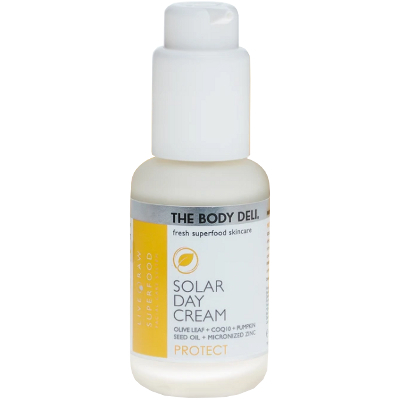 2. Body Deli Solar Day Cream
2. Body Deli Solar Day Cream I love the Body Deli products and this sunscreen does not disappoint, either. This is great for the face. Nice neutral scent, and feels really lightweight.
Get it here.
 3. Manda Organic Sun Paste, SPF 50
3. Manda Organic Sun Paste, SPF 50This stuff is for a serious ocean day. If Bear and I were surfing for hours, I would use this on our faces. It smells so good.
Get it here.
 4. Alba Botanica, SPF 30
4. Alba Botanica, SPF 30 Goes on like a charm, feels nice! The coconut shea butter one smells really good! Get it here.
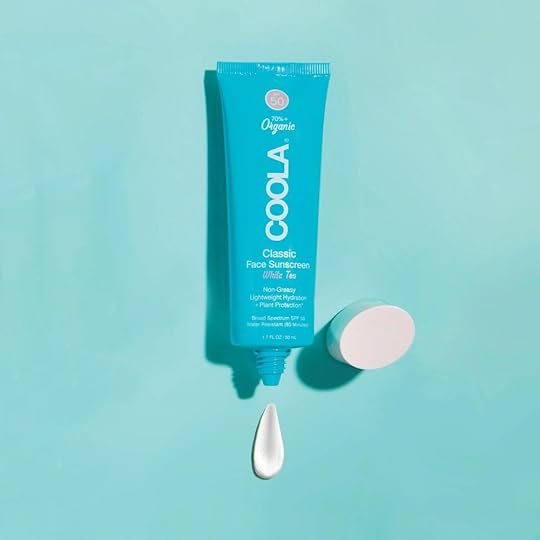 5. Coola, SPF 50
5. Coola, SPF 50 I love Coola’s sunscreen. There are a few different flavors but the gentle white tea scent is my pick. It’s reef safe and doesn’t leave a white tint. I mostly use this on my face but it feels nice on my arms and body and isn’t sticky either. I also love the Coola Guava Mango SPF 50 Sport organic sunscreen spray. It’s one of my favorites and smells incredible.
Get it here.
 6. Raw Elements Baby and Kids Stick, SPF 30
6. Raw Elements Baby and Kids Stick, SPF 30Great! I love the idea of a stick- especially with a kid, it makes it super easy to apply on the face quickly and then let them run back into the sun!
Get it here.
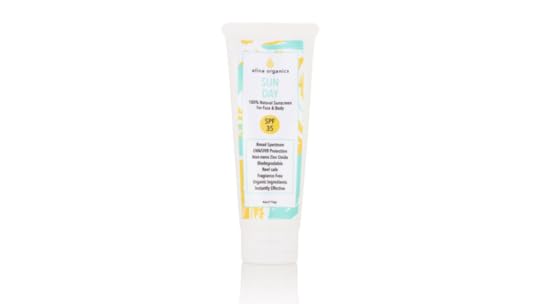 7. Elina Organics Sun Day, SPF 35
7. Elina Organics Sun Day, SPF 35Super white and thick- I had to rub this one in a lot!!! It is heavy on the white tint but it does go in nicely. Get it here.
For the Beach
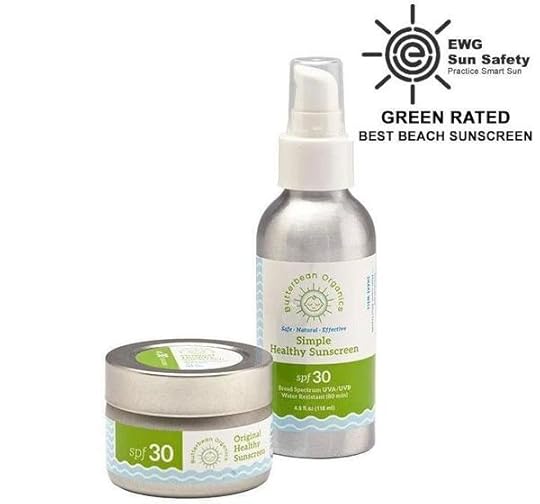 8. Butterbean, SPF 30
8. Butterbean, SPF 30This one is thick and can be hard to rub it in. It also leaves a subtle white tint. However, once it’s on, it feels nice and smells even nicer.
Get it here.
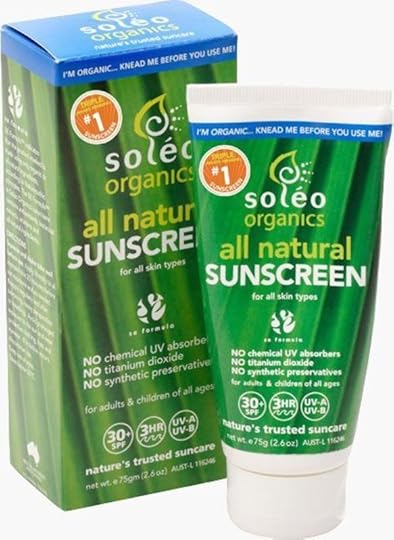 9. Soleo Organics, SPF 30
9. Soleo Organics, SPF 30This sunscreen rubs in rather easily and is great when you’re at the pool or beach as it has a three-hour water resistance window!
Get it here.
 10. MyChelle Replenishing Solar Defense, SPF 30
10. MyChelle Replenishing Solar Defense, SPF 30Smells great, lightweight, no white cast….but slightly sticky! Doesn’t feel overly sticky that I wouldn’t use it, though!
Get it here.
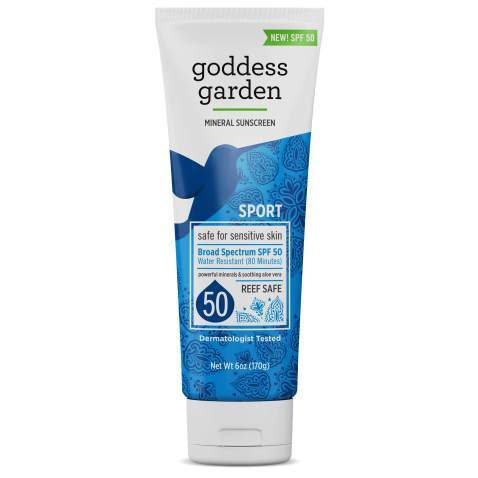 11. Goddess Garden Sport, SPF 50
11. Goddess Garden Sport, SPF 50Not white at all, but you need to really rub this one in! It does smell good and absorbs quickly once you rub it in.
Get it here.
 12. Babo, SPF 50
12. Babo, SPF 50Great for Bear — this one is very kid-friendly. It does give you a slight white tint, and it isn’t super easy to rub on, but it is great for the shoulders and chest and I feel like it’s one of the best for keeping littles protected.
Get it here.
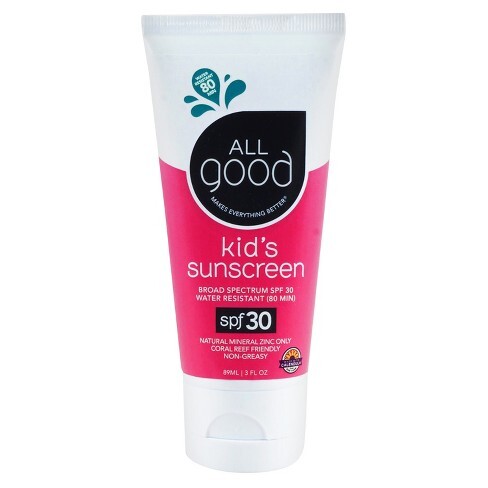 13. All Good Kids Sunscreen, SPF 30
13. All Good Kids Sunscreen, SPF 30This one didn’t really pass the test! Extremely white on the face and body- and sticky once it’s on!
Get it here.
Children’s Health Defense: Groundbreaking Change Powered By Parents
Courage Wanted.
Listening is so much more than an act of respect. It’s an opportunity for growth and a sacred part of any healthy community. As Children’s Health Defense (CHD) Founder, Chairman and Chief Litigation Counsel Robert F. Kennedy, Jr. learned nearly two decades ago, listening can also be a choice that changes the direction of your life — an act of courage.
It isn’t easy. Bobby Kennedy readily admits that he “was dragged kicking and screaming into this brawl.”
As one of the country’s most accomplished environmental attorneys, Bobby was well aware of regulatory capture and the impacts of environmental toxins like mercury. Even so, he was not prepared to face what would be a difficult and pivotal season when autism moms began approaching him at speaking engagements, providing him with evidence of the connection between mercury in vaccines and autism, educating him with a blunt truth he couldn’t ignore. These determined mothers would go on to help him launch World Mercury Project in 2016, which evolved into Children’s Health Defense in 2018.
CHD is a non-profit with a mission to end childhood health epidemics by working to eliminate harmful toxic exposures and demanding robust, transparent science and honest, independent regulatory processes. Our team includes some of the most accomplished experts, advocates and scientific and legal minds from around the world.
Over the last several decades, the lives of countless families have been turned upside down as they experienced firsthand the devastating effects that vaccines, pharmaceutical products and other environmental toxins had on their children — without acknowledgment, accountability or restitution. Through their experiences, these families have become advocates and trusted sources of credible information, educating others on how to prevent their children from the same or similar fate.
Children’s Health Defense has grown exponentially since its launch as a result of our focus on four key areas: education, litigation, science and advocacy.
What began in 2018 as Kennedy News and Views evolved into The Defender in 2020, reigniting scientific discourse as a trusted go-to resource for expert news and analysis. Our articles explore the theme of small (children) vs. Big Pharma, Big Tech, Big Energy, Big Food and Big Chemical and how these industries have subverted and corrupted our democracy, our regulatory agencies, the scientific research arms of academic institutions and the media to the point where these institutions — created to protect our children and us from corporate greed — now exist to protect corporate profits.
CHD.TV was created in 2021 to dissect mainstream media news and explore and relay what is happening in our world. Our shows feature over 40 hosts reporting daily on the real news, providing a platform for vigorous dialogue with a wide variety of expert guests. We provide accurate information and multiple viewpoints with in-depth analysis of vital health and environmental issues that educate and empower you to advocate for your family. Stay up to date on breaking news and daily events with Good Morning CHD.
CHD Publishing, our imprint through Skyhorse Publishing, has released nearly 20 books, including RFK, Jr.’s A Letter to Liberals and The Real Anthony Fauci — which has sold over one million copies despite aggressive censorship — and recent groundbreaking releases from Dr. Peter McCullough, Dr. Robert Malone and Ed Dowd.
Our rapidly growing network of CHD chapters lead grassroots efforts comprised of passionate parents and concerned citizens worldwide who disseminate vitally needed educational information to empower the communities they serve.
CHD has emerged as a force to be reckoned with on the legal front, with over 50 active lawsuits, including:
CHD is poised and ready to push forward with these battles. We continue to stand shoulder to shoulder with you to defend our freedoms and put an end to unjust policies that harm children’s health and violate our fundamental rights.
Kids today are living in a “toxic soup.” Although exposure to environmental toxins is continuous and somewhat unavoidable, we at CHD seek solutions, aiming to provide resources and published research on ways you can reduce the impacts on your family’s health.
Our team of EMR experts continues to research, educate and litigate the harmful health effects caused by widespread WiFi and 5G exposure.
The medical freedom movement has experienced unprecedented growth over the last three years. CHD’s work in law, science, public education and advocacy continues to open new avenues to enact change. We now have the momentum necessary to take back our country, reclaim our freedom, and protect our children.
We invite you to join our efforts as we create a better future for our children.
See you on the barricades!
-The Team at Children’s Health Defense
Alicia Silverstone's Blog
- Alicia Silverstone's profile
- 85 followers



